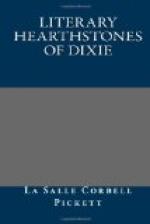Russell’s book-shop on King Street was a favorite place of meeting for the Club which recognized Simms as king by divine right. From these pleasant gatherings grew the thought of giving to Charleston a medium through which the productions of her thought might go out to the world. In April, 1857, appeared Russell’s Magazine, bearing the names of Paul Hamilton Hayne and W.B. Carlisle as editors, though upon Hayne devolved all the editorial work and much of the other writing for the new publication. He had helped to keep alive the Southern Literary Messenger after the death of Mr. White and the departure of Poe for other fields of labor, had assisted Richards on the Southern Literary Gazette and had been associate editor of Harvey’s Spectator. For Charleston had long been ambitious to become the literary centre of the South. The object of Russell’s Magazine was to uphold the cause of literature in Charleston and in the South, and incidentally to stand by the friends of the young editor, who carried his partisanship of William Gilmore Simms so far as to permit the publication of a severe criticism of Dana’s “Household Book of Poetry” because it did not include any of the verse of the Circle’s rugged mentor. Russell’s had a brilliant and brief career, falling upon silence in March, 1860; probably not much to the regret of Paul Hayne, who, while too conscientious to withhold his best effort from any enterprise that claimed him, was too distinctly a poet not to feel somewhat like Pegasus in pound when tied down to the editorial desk.
This quiet life, in which the gentle soul of Hayne, with its delicate sensitiveness, poetic insight, and appreciation of all beauty, found congenial environment, soon suffered a rude interruption. As Charleston was the first to throw off the yoke of Great Britain and draw up a constitution which she thought adapted to independent government, so did she first express the determination of South Carolina to break the bonds that held her turbulent political soul in uncongenial association.
Hayne heard the twelve-hour cannonade of Fort Sumter’s hundred and forty guns echoing over the sea, and saw the Stars and Bars flutter above the walls of the old fort. He saw Generals Bee and Johnson come back from Manassas, folded in the battle flag for which they had given their lives, to lie in state in the City Hall at the marble feet of Calhoun, the great political leader whom they had followed to the inevitable end. General Lee was in the old town for a little while. A man said to him, “It is difficult for so many men to abandon their business for the war.” The general replied, “Believe me, sir, the business of this generation is the war.” In the spirit of this answer Charleston met the crisis so suddenly come upon her.
All the young poet’s patriotic love and inherited martial instinct urged him to the battle, but his frail physique withheld him from the field, and he took service as an aide on the staff of Governor Pickens.




